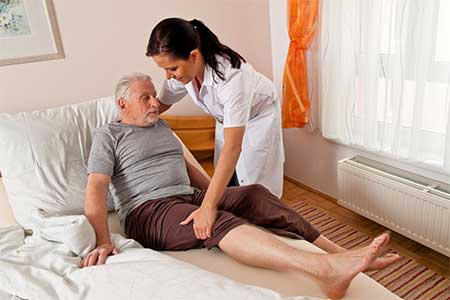One of the four levels of hospice care in the Medicare Hospice Benefit is Continuous Home Care (CHC). It is a challenging level of care and is required by Medicare’s regulations pertaining to hospices. ProfEdOnDemand will clarify some of the issues that arise in effectively providing CHC while complying with regulations and requirements.
What is CHC?
Continuous home care is to be provided only during periods of crisis (Sec. 418.204(a)) to maintain the beneficiary at home. A period of crisis is when the beneficiary requires the higher level of “continuous care” for at least 8 hours in a 24-hour period (midnight to midnight) to achieve palliation or management of acute medical symptoms. The care does not need to be “continuous”, but must total eight hours or more of care within the 24-hour period.
For hospice care to count as a CHC day the individual being cared for should not be in an inpatient facility and must receive predominantly nursing care on a continuous basis at home.
All nursing, hospice aide and homemaker services must be counted into the continuous home care time. When aide hours exceed the nursing hours, routine home care must be billed. To increase the percentage of nursing hours, hospices cannot choose to count fewer aide hours than were actually provided.
Who can provide CHC?
CHC consists predominantly of nursing care and can be provided by an RN, an LPN, or an LVN employed by the hospice. Nursing Services are provided by nurse practitioner, in whose absence they are to be performed by RN, LPN, LVN. Additional homemaker or hospice aide services to supplement nursing care are also provided.
At least 50 percent of the total care provided must be provided by a nurse.
Continuous care cannot be provided in a skilled nursing facility (SNF), inpatient hospital, hospice facility, a long term care hospital (LTCH), or an inpatient psychiatric facility.
Contracting for CHC
Nursing care is considered a hospice core service and must be provided by hospice employees, which means that hospices may not routinely contract with nurses for continuous care. Having adequate number of staff for continuous care is a challenge that most hospices face.
However, collaborating with other hospices or hospice programs for provision of core services can be done, in “extraordinary, exigent, or other non-routine circumstances”. An extraordinary circumstance is a short-term, temporary, unanticipated event such as high number of patients for unanticipated periods. This could be caused due to an unexpected increase in the number of patients requiring continuous care simultaneously or temporary staffing shortages due to illness. Hospices cannot routinely contract for a specific level of care (e.g., continuous care) or during specific hours of care (e.g., evenings and week-ends).
However, contracting hospice must maintain professional management responsibility for all services rendered. Regulations under Section 418.100(e) outline the responsibilities of the hospice for services provided under arrangement.
First of all, clear records and evidence needs to be maintained justifying the extraordinary circumstances that required the hospice to contract core services.
The contracting hospice is responsible for ensuring contracted staff is providing care that is consistent with the hospice policies and the patient’s plan of care. They must also be an active part of coordination of patient’s hospice care.
What doesn’t count as CHC hours?
When less than 8 hours of care are provided or if death occurs before 8 hours, it shouldn’t be counted as continuous care and should instead be billed as routine home care.
During a crisis, counselling is often required and essential, and certain other services are also required, however, these hours must not be counted in continuous care hours. For example, counselors, pastoral care, bereavement counselling by staff members and even medical social workers might need to be present, but should not be counted.
If at least 50 percent of the total care provided was not provided by a nurse within a 24 hour period, the hours should not be counted as continuous care. For example, if 6 hours of care is provided by a hospice aide, and 4 hours of care is provided by a skilled nurse, this should instead be billed as routine.
Care that spans midnight cannot be billed as continuous care hours. For example, skilled nursing care from 8:00 p.m. to 12:00 a.m. and from 12:00 a.m. to 4:00 a.m.
CHC eligibility requirements consist of grey areas which make it a challenge to properly identify and apply good assessment and documentation practices. To ensure proper utilization, hospices must understand the practical application and the regulatory requirements relating to CHC.
For more insight into the regulatory requirements for continuous home care under Medicare Hospice benefit, check out this audio conference by expert speaker Charlene Ross, MSN, MBA, RN.



